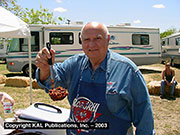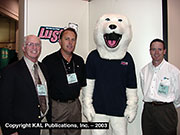
CIOMA Demolition Derby

Society of Independent Gasoline Marketers of America Spring Meeting

International Carwash Association Car Care World Expo
Want to see the photos that didn't make the issue? Check out
the Cutting Room
Floor.
Fleming Takes Action, Signs Deal with ConocoPhillips, Files Chapter 11
150 Gallons of Fuel Spilled in Delivery
Fuel Managers Opens New Colorado Terminal
Blending Problem Affects San Diego Arcos
Oregon DEQ Offers Diesel Tax Credit
LEWISVILLE, TX. — Fleming Companies, one of the largest distributors to the convenience store and supermarket industry, is reorganizing its operations after filing for Chapter 11 bankruptcy at the beginning of April.
At the same time, Fleming Companies Inc. has signed a deal with ConocoPhillips to supply 114 of its Conoco-branded convenience stores.
The c-stores will be supplied by Fleming's divisions based in Denver, Albuquerque and Fort Worth which will stock the Conoco stores in the Rocky Mountain states and Texas.
Fleming already supplies ConocoPhillips' Circle K branded convenience stores in approximately 500 locations in the Southwest.
According to the companies, they believe the deal will total $35 million in annual volume. The new supply agreement with the major oil company began in April.
Fleming, which supplies c-stores throughout the West, took the first action of its bankruptcy reorganization by cutting its work force by 1,800 jobs —15% of its total workers.
The company then announced that it would discontinue operations at five of its grocery wholesale divisions including Salt Lake City, UT., and Phoenix, AZ. The Phoenix warehouse was a 1.1 million square foot building at 624 S. 25th Avenue that employed 200 people. These facilities will be closed by mid-June.
Other closed facilities include Warsaw, NC., Northeast, MD., and King of Prussia, PA. Fleming officials say that collectively the closed divisions represent $1 billion in annualized revenue to the company.
At the same time, the company is launching operations at a new convenience distribution center in Denver. This facility, which opened in May, will replace the previous Denver division which was destroyed by fire in late 2002.
Fleming said it filed for Chapter 11 because it was unable to secure sufficient credit to continue its operations. Sensing a problem, many of Fleming's suppliers had stopped providing the company with goods to stock the stores because they were afraid they would not be paid.
Fleming had been under attack in recent months for potential accounting irregularities. Mark Hanson, the CEO of the Fleming Board of Directors, was fired in March and the company had said it would restate its past earnings.
Fleming says that it decided to file to gain protection from its creditors — which include ConAgra Foods, Procter & Gamble, General Mills, and Unilever — while it reorganizes and lines up alternative financing to continue its operations.
HESPERIA, CA. — A common carrier making a delivery to G&J Food Mart here spilled 150 gallons of gasoline and then failed to notify authorities of the spill.
According to local reports, a driver with Extra Tank Lines spilled approximately 150 gallons of gasoline while making a delivery to the station at 4:30 a.m. when he overfilled an underground storage tank. Instead of reporting the accident, however, the driver left the station and motorists drove onto the site to fill up their vehicles.
The spill was discovered by a commuter driving by the station site at Bear Valley Road and Cypress Avenue. Dave Shafer said "I smelled a lot of gas. It seemed like more than a small spill." Shafer called the local Sheriff's department which then called the Hesperia Fire Protection District who went to the station to investigate.
"We were very lucky we didn't see any explosions from all the cars driving through there," said Donn Funderburk, a fire marshal with the Hesperia Fire Protection District, who investigated the spill. Motorists drove through the station and pumped gasoline for three hours after the spill.
Fire officials taped off the entrances to the station shortly after they arrived at 7:30 a.m., closing the station until the spill could be cleaned up.
Funderburk estimated that the cleanup could "easily" cost several thousand dollars as gasoline had soaked over 3,000 square feet of blacktop in the parking lot.
Brian Headley of Hesperia Fire said the incident may also bring fines of up to $25,000 for not reporting the hazardous materials spill.
"The main safety violation is that the spill wasn't reported for several hours," said Headley.
FRUITA, CO. — Fuel Managers has opened a new terminal here, offering gasoline and diesel products to marketers in Colorado, Wyoming, and Utah.
The facility will be supplied by Colorado Fuel Manufacturers Inc., a subsidiary of Tulsa, OK.-based Fuel Managers.
"This is a strategic move into the refining business," said Fuel Managers CEO Bob Phillips, "which enables us to provide stable volumes of high-quality motor fuels to a critical customer in a geographic market that is normally under-supplied."
According to the company, the new terminal includes a fractionation and blending plant which are capable of producing low sulfur gasoline, isobutane, butane, and propane.
SAN DIEGO, CA. — Almost half of the Arco-branded stations in the San Diego area received non-compliant gasoline after a failure of in-line blending equipment at the rack.
According to the California Energy Commission, 59 of the 120 Arco stations in the area received regular gasoline that did not meet the state's oxygenate requirements. The equipment reportedly did not blend a sufficient amount of ethanol into the gasoline which was then delivered to the stations.
Arco sent pumper trucks back to the gasoline stations to clean out their tanks, brought the gasoline back to the terminal, reblended it with the ethanol, and returned the fuel to the stations.
Although some Arco stations ran out of unleaded gasoline while the problem was being solved, most met their customers' needs by pumping premium gasoline.
PORTLAND, OR. — The Oregon Department of Environmental Quality is offering a tax credit to encourage diesel users to cut pollution from their engines.
Under the DEQ's Clean Diesel Initiative program, companies that retrofit their diesel engines with a catalyzed soot filter are eligible for a tax credit to cover 35% of the retrofitting costs.
Cost of the conversion is estimated at $2,000 to $6,000 per vehicle.
"Vehicle owners end up with a much cleaner burning engine at much less cost than if they switched to an alternative fuel clean-burning engine," said Kevin Downing, DEQ air quality planner, "such as one using compressed natural gas." He added, "You can correctly call this 'clean diesel.'"
The DEQ said that they support the Environmental Protection Agency's plans to establish more stringent emission requirements for new diesel engines. They came up with the tax credit plan, however, because they acknowledge "because of diesel engines' long life, significant gains in reducing diesel particulates won't take place for quite some time relying on new vehicle purchases alone."
"Diesel engines are a critical part of the Oregon and U.S. economy," added Downing. "These engines are powerful and durable. But by retrofitting their diesel engines — on both off-road equipment and on-road vehicles — industries can make a positive environmental difference without sacrificing the power and efficiency of diesel engines."
Originally published in the June 2003 issue of O&A Marketing News.
Copyright 2003 by KAL Publications Inc.
Serving the 13 Western States, the World's Largest Gasoline, Oil, Fuel, TBA and Automotive Service Market